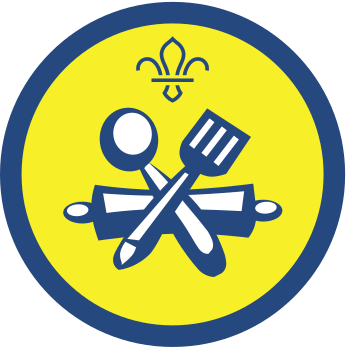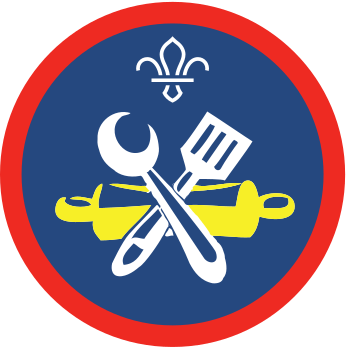
Bake Welsh cakes
You’ll need
- Mixing bowls
- Ingredients (see recipe card)
- Sieve
- Rolling pin
- Round cookie cutter
- Gas stoves
- Heavy frying pan
- Method to extinguish a fire, such as a fire blanket or fire extinguisher
- Protective equipment, such as heatproof gloves and tea towel
- First aid kit for burns
Before you begin
- Use the safety checklist to help you plan and risk assess your activity. There's also more guidance to help you carry out your risk assessment, including examples.
- Make sure all young people and adults involved in the activity know how to take part safely.
- Make sure you’ll have enough adult helpers. You may need some parents and carers to help.
‘Dydd Gwyl Dewi Sant Hapus’ means ‘Happy Saint David’s day’ in Welsh.
St David’s Day is celebrated on 1 March each year. St David’s the patron saint of Wales and the 1 March marks the anniversary of St David’s death in 589 AD. The day’s traditionally celebrated by hosting parades, eating traditional Welsh food, such as Welsh rarebit, and wearing the symbols of Wales and St David, which are daffodils and leeks.
St David was born in Caerfai in South Wales. He lived as a travelling monk, who established and restored twelve monasteries. He’s known for performing miracles. It’s said that he once preached so loudly that the ground below him rose into a hill so everyone could see him.
As you may have guessed, Welsh cakes come from Wales. The cakes are a cross between a biscuit, a scone and a pancake. They’re made from simple ingredients, including flour, sugar, milk and butter, which are combined and then fried. Historically, Welsh cakes would have been cooked on a hot bake stone over a fire.
- You could run our kitchen safety and hygiene activities, Kitchen risk bingo and Home kitchen hygiene prior to running this session.
- Remember to have a hand washing station and take extra hygiene precautions when handling raw meat, such as regular hand washing, having separate equipment for raw and cooked meat, and washing up equipment as soon as it's been used. Take a look at our guidance on food preparation.
- Make sure you have all the ingredients ready.
- Remember to check for allergies, eating problems or dietary requirements and adjust the recipe as needed. Make sure you've checked everyone's dietary requirements and allergies then adapted the recipe as appropriate. This may include ensuring no cross-contamination during food storage, preparation and serving, too. Check if there are any items of food (or packaging) that people can’t touch or be near to or if there are items that people might not be comfortable using in the activity.
Getting ready to bake
- Gather everyone together and tell them that they’re going to make Welsh cakes. You may want to all bake them all together, or make them in small groups and give each group the equipment and instructions.
- Alternatively, an adult volunteer could prepare the Welsh cakes in front of the section, while another adult volunteer explains the significance of Saint David’s day.
Making the Welsh cakes
Ingredients
- 225g plain flour
- 85g caster sugar
- 1 or 2 handfuls of sultanas (optional)
- ½ tsp mixed spice (optional)
- 1 egg
- 100g butter or margarine
- ½ tsp baking powder
Prep time: 10-15 minutes
Cook time: 6 minutes
Makes: 16 cakes
- First, sieve flour into a mixing bowl, then add half the butter or margarine, sugar and baking powder.
- Rub the ingredients together with the tips of your fingers until it resembles breadcrumbs.
- Mix in the sultanas and egg. You may want to add a splash of milk if the mixture’s dry.
- Lightly flour a surface and roll out the dough using a rolling pin. Make sure the dough is about the thickness of your little finger.
- Once it’s rolled out, use a cookie cutter to cut out your Welsh cakes.
- Grease your frying pan using the remaining butter.
- An adult volunteer should turn on the stove or hob and place the frying pan over a medium heat.
- Cook the Welsh cakes for about 3 minutes on each side until golden brown. You may need to do this in batches.
- Once they’re cooked, an adult volunteer should remove the pan and place it on a heatproof surface, away from young people.
- Using heatproof tongs, or similar, the Welsh cakes can be removed and left on a plate or cooling rack to cool down.
- Make sure an adult is always supervising any hob or stove. You may want an adult volunteer to cook all the Welsh cakes while young people take part in another activity, depending on if you can run both activities in-line with the Yellow Card and ratios.
- Once cooked, everyone can give their Welsh cakes a try – perhaps with some butter – or people may want to take them home and that’s OK, too.
- Remember that everyone can get involved in tidying and washing up afterwards.
Reflection
This activity was a chance for young people to take part in a baking activity. Have you tried Welsh cakes before? How did it taste? Would you eat it again? What other Welsh dishes can you think of that you have tried, or would like to try?
This activity was all about trying new things. Had anyone made similar recipes before? What did people do to make sure they were prepared to get stuck in? Maybe they read through the whole recipe or measured out the ingredients before they got started. When else can being prepared make it easier to try something new?
This activity was also about being independent. What did people do for themselves in this activity? Maybe they took charge of making the dough or did the tricky bit of cutting out the cakes. Take some time to celebrate everyone’s achievements as you enjoy your creations.
Safety
All activities must be safely managed. You must complete a thorough risk assessment and take appropriate steps to reduce risk. Use the safety checklist to help you plan and risk assess your activity. Always get approval for the activity, and have suitable supervision and an InTouch process.
- Cooking
Teach young people how to use cooking equipment safely. Supervise them appropriately throughout. Make sure it’s safe to use and follow manufacturers’ guidelines for use.
- Fires and stoves
Make sure anyone using fires and stoves is doing so safely. Check that the equipment and area are suitable and have plenty of ventilation. Follow the gas safety guidance. Have a safe way to extinguish the fire in an emergency.
- Food
Remember to check for allergies, eating problems, fasting or dietary requirements and adjust the recipe as needed. Make sure you’ve suitable areas for storing and preparing food and avoid cross contamination of different foods. Take a look at our guidance on food safety and hygiene.
An adult volunteer may want to prepare the batter or pre-weigh the ingredients in advance to decrease the level of challenge.
- There are lots of different jobs that need doing when planning, making and cooking. There’s a role for everyone, so encourage everyone to be involved in a way that works for them.
- If anyone needs help or struggles with fine motor skills, give them the opportunity to work in pairs, with a young leader or an adult volunteer. Alternatively, swap out the items for something easier to handle.
- Remember to check for allergies or dietary requirements and adjust the recipe as needed.
All Scout activities should be inclusive and accessible.
You may want to give Welsh cakes as a gift to celebrate Saint David’s day. Consider decorating some gift bags with paper daffodils to package your cakes in.
This activity is great as part of an evening celebrating Saint David’s day.
Allow your young people to decide on what to add to their Welsh cakes. The adult volunteer may want to provide a variety of ingredients for everyone to experiment with, such as chocolate chips, jam and cream, or marmite!



